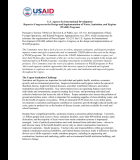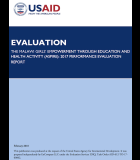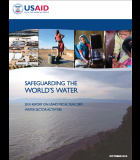Mwayi WaMoyo Project - Child Survival Health Grants Program (Mwayi WaMoyo)
Mwayi wa Mayo was a five-year Innovation Project (CS-27 cycle) running between I October 2011-31 March 2016. The project was funded by USAID's Child Survival and Health Grant Program (CSHGP), with matching funding from Save the Children, Towers Watson, and the Pfizer Foundation. The project targeted hard-to-reach communities in Blantyre District with limited access to health care services. Malaria, pneumonia, diarrhea and under-nutrition are the primary contributors to morbidity and mortality of children 1-59 months old globally and in Malawi, with newborns dying of asphyxia, prematurity/low birthweight (LBW) and sepsis. The project's strategic objective was increased use of key MNCH + Postpartum Family Planning (PPFP) services and practices. All project activities were implemented in close collaboration with the Blantyre District Health Management Team (DHMT) using routine district systems. The project had four main components:
- Increased access to and availability of high impact MNCH and FP interventions;
- Improved quality of high impact MNCH and FP interventions;
- Increased demand for MNCH and FP care services and healthy practices in the home and community; and
- An enabled environment at all levels to support effective delivery of MNCH and FP interventions.
The project innovation was the delivery of high impact interventions using an integrated approach to training, supervision and clinical mentoring; and the project's OR component aimed to test whether the integrated approach reduced missed opportunities and affected quality of HSA case management.
Activity Description
Mwayi wa Moyo will incorporate family planning with objective to increase use of key postpartum family planning (PPFP) services and practices among mothers with children under two and their partners. Save the Children will work with the MOH to strengthen the integrated package to include PPFP. A “no-missed” opportunity intervention will seek to amplify the number of mothers reached with information and services during the first two years postpartum. In addition, Save the Children and partners will identify effective approaches to reducing the high teenage pregnancy rate in Malawi.
The program components are control of diarrheal diseases, maternal and newborn care, and pnemonia case management.
Expected Outcomes
- Increased access to and availability of services
- Improved quality of services
- Demand for interventions improved
Actual Outcomes
- 68.0% (268/394) of the HHs with children aged 0- 23 months treated water effectively.
- Results indicated that 64.0% of the overall respondents had a hand washing place, up from 43% at the beginning of the project.




